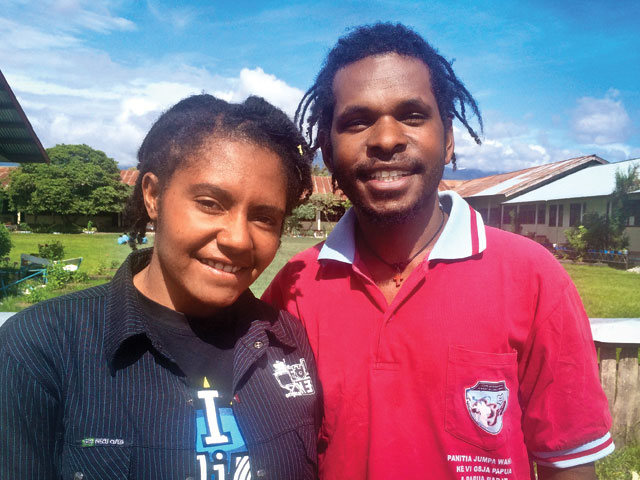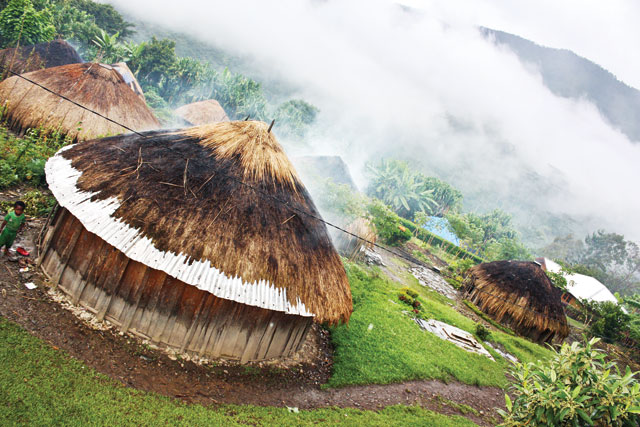At 21 years old, Disfol Wenda and Ika Tabuni could not be any more different to how their parents were at their age. Within a generation, these youths have taken the fast track to catching up with their peers around the world: they are now texting, chatting via Facebook, dating each other and – most notably – wearing clothes.
Disfol and Ika come from the highlands of Papua, Indonesia, where the thin line between clad and nude has traditionally been straddled by the adornment of a penis gourd – the dried shell of a long, squash-like vegetable, held upright by a string secured around the waist. Historically, men wore penis gourds, or kotekas, year-round and women wore only reed or braided cord skirts. To stay warm in temperatures below 5°C, they covered their exposed skin with pig grease.
This mountainous region of Indonesia’s easternmost province is strikingly beautiful and absurdly remote. The area is only accessible by flights from coastal areas, and many sub-districts have to be reached on foot. Much remains unknown about Papua and the neighbouring province of West Papua, where more than 300 ethnic groups collectively speak 250 languages.
Contentiously recognised as part of Indonesia in 1969, Papua has experienced dramatic transitions over the past few decades and has consequently become a land of paradoxes. Many districts have modernised, while others remain isolated, without basic infrastructure. More than 40% of the population live below the national poverty line, and money is still a relatively recent concept. Yet the area is resource rich, and the government pours copious aid into villages. Businesses are burgeoning in cities, while the work of NGOs in the highlands is sometimes interrupted due to tribal warfare.
But clothing remains the clearest contrast between the old way of life and the new, and signifies a growing chasm between today’s youth and their elders. “We [used to] feel OK to see our parents naked in pictures. But now, we don’t feel comfortable,” said 19-year-old Rahel Tabuni. Her father started wearing the koteka in his teenage years. His first pair of trousers arrived with Christian missionaries, and he ran for hours to receive the strange and precious donation.
“The older generation is staying in the koteka, but the new generation have started to use clothes, even in remote areas,” said Sudhir Khanal, Unicef’s child survival and development specialist in Papua. “When I first came here [two years ago], people were saying: ‘If I wear clothes I need to wash them. I don’t have soap. I don’t have money to buy soap.’ We hardly see any youth wearing the koteka of late.”
Urban and younger men are instead opting for jeans and t-shirts – a belated victory for the Indonesian government, which ran campaigns to replace the koteka with trousers as far back as the 1970s. On the streets of Wamena, the highlands’ largest town, young people sporting batik shirts are interspersed with koteka-wearing grandfathers, who stow money inside their gourds. “When I see my people using traditional clothes, I’m proud, because they still keep my culture,” said Disfol, whose father wore the koteka until getting married. “But I’m afraid to use [them].”

Those aged 24 and younger represent 52% of the population in Papua and West Papua, and this large contingent finds itself at a significant juncture. While life in home villages remains simple, youths’ transition into cities for schooling brings with it new communication tools and a removal from traditional values. Youngsters may be proud of their history, but many are eager to move at the pace of the outside world. “Overall, Indonesia is a media- and technology-savvy country, and Papua is not an exception,” said Khanal, who estimates that 80% of Papuans now have mobile phones. “Even if there’s no [network] connection, they want to have a phone.”
Technology has allowed families separated by mountains to be connected in a way never before possible. And youths’ interactions within and outside of Papua have been revolutionised as they embrace text messaging and social media. “Through technology, I can now see the world,” said Hernita Siep, 19.
Although connecting to the internet is costly and access remains limited, online forums are growing in popularity in Wamena, with young people reporting that all their friends have email, Skype and Facebook – even if they are only able to update their statuses once a month. This appears to have had spillover effects in building skill sets. “They’re more confident because they communicate with each other,” said Irene Heidy, project manager for international NGO World Relief. “Even though it’s online, that creates confidence in real life too.”
Communication tools also play a role in dating. Many young people in cities have significant others, and technology allows them to sidestep the expectation that family be involved. Disfol and Ika, who have been dating for four years, gave their phone numbers to each other through friends after being introduced, and began their relationship by texting and calling each other.
Their ancestors were not afforded the same liberties. In their tribes, a young man was traditionally forbidden to visit, spend the night, or even eat at an unmarried girl’s home. If he did, he might be killed. Though there are still consequences for premarital sex in many places, the cost now manifests itself in the payment of cash or pigs to the girl’s family.
“Our parents submitted more to cultural regulations and [were] more afraid to have a boyfriend or girlfriend,” Hernita said. “Today, even though cultural rules are still there, young people don’t care about them as much.”

Newfound freedoms, however, may be coming at a cost. Technology is increasingly being used to view pornography and arrange transactional sex. “It makes us more vulnerable to bad behaviours. We are using our phones, the internet, for pornography,” Rahel said.
Papuan youths have few mentors and limited information to guide them. Dating only briefly, they transition to marriage at an early age, usually at about 20 or 21 and often in response to pregnancy. Youngsters are also engaging in high-risk behaviours such as having multiple concurrent sexual partners. “Sex is like a game – they can play anywhere,” Disfol said. He and his male friends speak openly among themselves about the still-taboo subject. “All of my friends share how many girls they have had sex with. It’s normal.”
To add to the dangers, HIV is on the rise, gender-based violence is widespread, unemployment is high and knowledge is low. Representing only 1.5% of Indonesia’s population, Papua accounted for 15% of all new cases of HIV in 2011. Among those between the ages of 15 and 24, the HIV prevalence rate is 3%, according to Unicef. “Our efforts are kind of like a little water in an ocean,” said Heidy, who has reached about 10,000 young people in the highlands with HIV prevention messages. “There’s still so much to do.”
Unicef has also focused on addressing HIV, as well as increasing youth participation in decision-making processes for policy and programming. “There is little recognition of young people. We don’t want their role to be undermined by senior groups saying they can make decisions for them. It’s imperative that we build their capacity,” Khanal said.
Today’s youth have had more opportunities for education than previous generations, and many are intent on protecting themselves in the midst of change. Disfol and Ika, for example, belong to the Wamena-based network Youth Forum Baliem Peace. The 85-member and majority-female forum is self-governed by members to reach their peers through advocacy campaigns, radio programmes and group meetings. “It’s exciting to see,” said Heidy. “They’re spending time in a positive way. They feel responsible to other Papuan youths who have never heard the information they have.”
Disfol and Ika try to model a healthy dating relationship through safe sexual behaviours and equal partnership. “We want to be an example for other young people,” Ika said.
“We want to make a difference,” Disfol added. “We can help others through good information, so that our generation can make good choices.”
Groups such as the youth forum provide safe spaces for members of this generation to voice their feelings and navigate the myriad transitions associated with the current abutting the traditional. When it comes to the penis gourd, however, the majority seem to welcome a new era. The koteka will likely die out with today’s elderly, making the highlands just a little less fascinating. “The world will always develop,” Disfol said. “If everything changed, I would feel sad. But I also feel happy, because we can follow modern development.”


